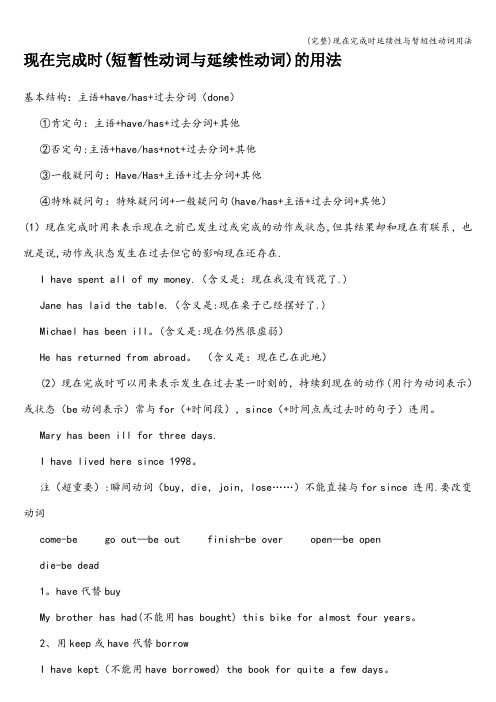英语人教版八年级下册现在完成时中延续性动词和短暂性动词的用法
现在完成时延续性与暂短性动词用法

现在完成时延续性与暂短性动词用法编辑整理:尊敬的读者朋友们:这里是精品文档编辑中心,本文档内容是由我和我的同事精心编辑整理后发布的,发布之前我们对文中内容进行仔细校对,但是难免会有疏漏的地方,但是任然希望(现在完成时延续性与暂短性动词用法)的内容能够给您的工作和学习带来便利。
同时也真诚的希望收到您的建议和反馈,这将是我们进步的源泉,前进的动力。
本文可编辑可修改,如果觉得对您有帮助请收藏以便随时查阅,最后祝您生活愉快业绩进步,以下为现在完成时延续性与暂短性动词用法的全部内容。
现在完成时(短暂性动词与延续性动词)的用法基本结构:主语+have/has+过去分词(done)①肯定句:主语+have/has+过去分词+其他②否定句:主语+have/has+not+过去分词+其他③一般疑问句:Have/Has+主语+过去分词+其他④特殊疑问句:特殊疑问词+一般疑问句(have/has+主语+过去分词+其他)(1)现在完成时用来表示现在之前已发生过或完成的动作或状态,但其结果却和现在有联系,也就是说,动作或状态发生在过去但它的影响现在还存在.I have spent all of my money。
(含义是:现在我没有钱花了。
)Jane has laid the table。
(含义是:现在桌子已经摆好了.)Michael has been ill.(含义是:现在仍然很虚弱)He has returned from abroad. (含义是:现在已在此地)(2)现在完成时可以用来表示发生在过去某一时刻的,持续到现在的动作(用行为动词表示)或状态(be动词表示)常与for(+时间段),since(+时间点或过去时的句子)连用.Mary has been ill for three days.I have lived here since 1998.注(超重要):瞬间动词(buy,die,join,lose……)不能直接与for since 连用.要改变动词come-be go out—be out finish-be over open-be opendie—be dead1。
人教版英语八年级下册现在完成时(易懂版本)

现在完成时一、两个含义:①表示动作发生在过去,但对现在的情况造成了影响。
(借古讽今)He opened the door.The door is open.I saw the movie.I have seen the movie.I got married.I have got married.②表示从过去某一时间开始一直延续到现在并还可能继续延续下去的动作,用于延续性动词,且句中常带有表示一段时间的时间状语,如:since + 时间点/从句,for two months, so far等。
(从古至今)I have learned English for 10 years/since 10 years ago.I have lived in Chengdu for 12 years/since 12 years ago.I have been a teacher for 2 years/ since 2 years ago.二、构成have/has+动词的过去分词(done)三、标志词for, since, already, yet, before, recently, over the …., in the past few…..四、already与yet的区别already用于肯定句(已经)yet用于否定句(还)和疑问句(已经)ever & neverever作副词,意为“曾经”,常用于现在完成时的一般疑问句和肯定句中,置于主语之后,过去分词之前。
never作副词,意为“从不;从未”,用于现在完成时中,表示否定,位于助动词have/has之后,过去分词之前。
五.have been to & have gone to & have been inhave been to 去了某地,已回have gone to 去了某地,未回have been in 在哪里待了多久后面是地点副词there、here、home 时,省略to六、延续性和非延续性1. 含义:延续性动词表示能够延续的动作,这种动作可以延续下去或产生持久影响。
人教版八年级下英语现在完成时语法讲解

现在完成时(I)第八单元语法知识等词连用.常用于肯定句或疑问句(均表示:已经).(表示:还、尚),疑问句末尾(表示:已经).现在完成时的构成及句型结构:(注:过去分词的变化分规则变化与不规则变化,规则变化与动词原形变过去式一样,不规则变化见教材137页)1.肯定句:主语+have/has+过去分词+其他+时间.eg: I have already lost the key.我已经弄丢了钥匙.(我现在没有钥匙)Hehas everread that book .他曾经看过这本书. (了解书的内容)Theyhave just cleaned their hands.他们刚刚洗过手了. (手是干净的) 2.否定句:主语+haven’t/ hasn’t+过去分词+其他+时间.eg: I haven’tlost the key yet.Hehasn’t ever read that book .Theyhaven’t just cleanedtheir hands.3.一般疑问句:Have/Has+主语+过去分词+其他+时间?肯定回答:Yes, 主语+have/ has. 否定回答:No, 主语+haven’t/hasn’t.eg:Have you already lost the key? Yes, I have. No, I haven’t.Has he ever read the book? Yes, he has. No, he hasn’t.Have they just cleaned their hands? Yes, they have. No, they haven’t.4.特殊疑问句:特殊疑问词+have/has+主语+过去分词+其他+时间?eg: What have you alreadydone?(done是do/does的过去分词)What has he ever done?What have they just done?定义:(2)现在完成时表示从过去开始一直持续到现在还有可能继续持续下去的动作或状解释:一直在学,持续了五年,并且还可能持续学下去.He has lived in Beijing since he was born . (自从他出生以后就居住在北京)解释:从出生后就一直住在北京,持续到现在,还有可能一直住下去)Have you stayed here since3 o’clock?(自从3点后你就一直呆在这儿吗?)例题:选用for和since填空:1.We haven’t seen each other ___ a long time.2.His father has been in the factory ____ 10 years ago.3.The film has been on ____ 20 minutes.4.Mr. Green has worked here _____ he came to China.5.His grandparents have been dead _____ several years.6. It’s five years ______ we met last time.7.I have already had dinner. (否定)I _______ _______ dinner _______.8. Mum has cooked the dinner.Mum _______ ________ the dinner.9. Susan has learned English at school. Susan________________English at school.10.I have already had dinner. (提问)_______ _______ ________ _________ _______?11. He has just finished his homework. _______ _______ _______ ________ ________?12. Susan has learned English at school. _______ _______ ________ ________ _______?过去的时间状语连用.eg: I have already seen the film. (现在完成时,已经看了这部电影,并且知道电影的内容)I saw the film last week. (一般过去式,因为后面有表示过去的时间状语last week)He has lived here since 1993. (现在完成时,后面有since引导的时间状语从句)He lived here in 1993. (一般过去时,1993年住在这儿,现在没住在这儿了)例题:1. _____ you ________(clean) the room?Yes, we__________(do) that already.2. When _______ you ______(do) it?We _______(do) it an hour ago.3.______ he ______(see) this film yet? Yes.4. When _____ he _____(see) it?He______ it last week.5. I _______ (read) the novel twice. It’s interesting.6.Mr. Chen _________(give)up smoking last year.7. She _____(go) to Pairs, hasn’t she? Yes.How ____ she ____(go) there?She ____(go) there by air.现在完成时(II)第九单元语法知识1.构成:含有be动词的现在完成时的谓语部分由“have/has+ been+ to+地点”构成,表示:曾经去过某地… (been是be的过去分词,不规则变化)2.基本句型:(1)肯定句:主语+have/has+ been+ to+地点.肯定回答:Yes, 主语+ have/has. 否定回答:主语+haven’t/ hasn’t.eg: Have you been to Australia? Yes, I have. No. I haven’t.Have they been toBeijing? Yes, they have. No, they haven’t.Has he been toSouth Africa? Yes, he has. No, he hasn’t.(4)特殊疑问句:特殊疑问词+have/has+ 主语+ been?eg:Where have you been?Where have they been?Where has he been?3.用法:用来表示之前已经发生和完成度的动作与状态,其结果却和现在有联系.动作和结果发生在过去,但它的影响现在还在.可以和never, ever,once, twice, three/four…times 等副词连用.eg: They have been to Chongqing twice.I have never been to Sichuan.Has she ever been to Hainan?3.区别:eg:例题:1.—Where is your brother?—He __________ the shop. He’ll be back soon.2. — _____ you ever _______ to America?—Yes, I _______ New York twice.3. —David ___________ Australia.—I’m sure he has already arrived.4. —Is Benny here?—No, he ______ the school library. He left five minutes ago.4.Mike and his parents __________ the south for half a year.6. Mum is not at home now. she _________ the shop.7. You can’t find him. He__________Xi’an.8. Mr. Zhang __________ this school for ten years. He knows everyone here.9. Miss. Brown __________ China three times.10. I __________ the West lake, Look, I have taken many photos of it .11. Tom ___________ Jim’s home, but he hasn’t come back.12. We ____________ the bookshop and bought many books.13. My parents _________ Shandong for ten years.现在完成时(III)第十单元语法知识动词按其动作发生的方式,发生过程的长短可分为延续性动词与非延续性动词。
(完整)现在完成时延续性与暂短性动词用法

现在完成时(短暂性动词与延续性动词)的用法基本结构:主语+have/has+过去分词(done)①肯定句:主语+have/has+过去分词+其他②否定句:主语+have/has+not+过去分词+其他③一般疑问句:Have/Has+主语+过去分词+其他④特殊疑问句:特殊疑问词+一般疑问句(have/has+主语+过去分词+其他)(1)现在完成时用来表示现在之前已发生过或完成的动作或状态,但其结果却和现在有联系,也就是说,动作或状态发生在过去但它的影响现在还存在.I have spent all of my money.(含义是:现在我没有钱花了.)Jane has laid the table.(含义是:现在桌子已经摆好了.)Michael has been ill。
(含义是:现在仍然很虚弱)He has returned from abroad。
(含义是:现在已在此地)(2)现在完成时可以用来表示发生在过去某一时刻的,持续到现在的动作(用行为动词表示)或状态(be动词表示)常与for(+时间段),since(+时间点或过去时的句子)连用。
Mary has been ill for three days.I have lived here since 1998。
注(超重要):瞬间动词(buy,die,join,lose……)不能直接与for since 连用.要改变动词come-be go out—be out finish-be over open—be opendie-be dead1。
have代替buyMy brother has had(不能用has bought) this bike for almost four years。
2、用keep或have代替borrowI have kept(不能用have borrowed) the book for quite a few days。
初中英语人教新目标八年级下册Grammar现在完成时中的延续性动词与非延续性动词PPT

Exercises
1). 我买了这块表五年了。
I have bought this watch for five years.
I have had this watch for five years.
2). 这位老人已经去世十年了。
The old man has died since 10 years ago.
come/go —be here/ be (in/at)
leave— be away from
arrive(at/in)/ get (to)/ reach— be (in/at)
come back/return — be back get up —be up
go out — be out
go to bed — be in bed
begin / start —be on
join — be in/be a member of
fall ill — be ill
fall asleep/go to sleep — be asleep
lose — be lost
finish—be over
open— be open
close— be closed
1.延续性动词与非延续性动词的定义
延续性动词表示能够延续的动作,如: study, work, stand, walk, keep, have, wait, watch, sing, sleep等。
这类动词能与表延续的时间状语连用,如for + 时间段、since + 时间 点/从句;能用在how long引导的特殊疑问句中。
E.g.: I have studied in this school since two years ago. The baby has slept for an hour. How long have you waited for the bus?
英语知识 _ 初中英语,延续性动词和瞬间性动词的用法

一、延续性动词延续性动词,表示的动作不但可以延续,而且可以产生持久的影响。
常见的这类动词有:b e,h a v e,ke e p,k n o w,l e a r n,l i e,l i v e,re a d,s i n g,s l e e p,s t a n d,s t a y,w a i t,w a l k,w a tc h等。
延续性动词的用法很广,但常见于现在完成时中的句子中,且常与f o r,h o w,l o n g,s i n c e 等引导的表示一段时间的状语或状语从句连用。
例如:I h a v e l e a r n e d m o re t h a n1000C h i n e s e w o rd s s i n c e I c a m e t o C h i n a.自从来到中国,我已经学会了l千多个汉字。
I h a v e ke p t t h e p i c t u re f o r a b o u t t h re e y e a r s.。
这张画我保存了大约三年二、瞬间性动词瞬间性动词,又称为终止性动词或非延续性动词,它表示的动作不能延续,也就是说动作一旦发生就立即结束,并产生某种结果。
常见的这类动词有:a c c e p t,a r r i v e,b ec o m e,b e g i n,b o r ro w,b re a k,b u y,c a tc h,c l o s e,c o m e,d i e,e n d,f a l l,f i n i s h,g e t,g i v e,g o,j o i n,l e a v e,p u t,re a c h,re c e i v e,sh u t,s t a r t,s t o p等。
用在现在完成时要注意下面三点:①瞬间性动词可直接用来表示某一动作的完成。
例如:T h e y h a v e re a c h e d S h a n g h a i.他们已经到达了上海。
英语人教版八年级下册现在完成时态中瞬间动词的用法

现在完成时态中瞬间动词的用法延续性动词和非延续性性动词一、延续性动词与非延续性动词的特征英语中,按动作发生的方式、过程的长短,可将动词分为延续性动词和非延续性动词。
延续性动词,也叫作持续性动词,表示能够延续的动作,这种动作发生后可以一直持续下去。
如:learn, work, stand, lie, know, walk, keep, have, wait, watch, sing, read, sleep, live, stay等。
非延续性动词,也叫作终止性动词、瞬间性动词或短暂性动词,表示不能延续的动作,即动作从发生到结束所持续的时间非常短,且大多都是动作发生后也就马上结束。
如open, close, finish, begin, come, go, arrive, reach, get to, leave, move, borrow, buy等。
二、延续性动词与非延续性动词的用法1、延续性动词可以和表示"一段时间"的状语连用。
表示"一段时间"的短语结构有:for two weeks, in/during the past three years, since 1990, how long, from Monday to Friday ,between 8:00 to 11:00, all the year round等。
如:I have learned English since I was six years old.从六岁以来,我就学英语了。
2、非延续性动词表示的动作具有短暂性和不可持续性等特点,因此,其肯定句不可与表示“一段时间”的状语连用。
但是非延续性动词的否定结构表示状态时,可以和表示“一段时间”的状语连用。
如:正确:He has bought some books.(没有表示“一段时间”的状语) 正确:He hasn't bought any books for a long time.(否定句可与表示“一段时间”的状语连用) 错误:He has bought the books for 3 days.(肯定句不能和表示“一段时间”的状语连用)3、while引导时间状语从句时,表示的是一个较长的时间或过程,属于“一段时间”,从句中的谓语动词用延续性动词。
初中英语中短暂性动词与延续性动词的用法

初中英语中短暂性动词与延续性动词的用法英语中,按动词延续的时间长短,可将动词分为延续性动词和短暂性动词。
延续性动词如learn, study, work, play, wait等。
短暂性动词是非延续性动词,即动作一开始便结束的动词,又可称结束性动词,瞬间动词,如come, go, begin, start, become, join, end, die, buy, arrive, reach, borrow, lend, get to know等。
一.短暂性动词与延续性动词在现在完成时中的用法:现在完成时中用法(一):表示发生在过去,迄今已经完成,并对现在产生影响或产生结果的动作,常用ever, yet, already, just等状语,谓语动词既可是延续性动词,也可是短暂性动词。
如:She has just borrowed the book from the library.(borrow是短暂性动词)I have learned a little about Japanese. (learn 是延续性动词)现在完成时中用法(二):表示始于过去某时并一直延续到现在的动作或状态,常与表示始于过去某一时刻并一直延续到现在的时间状语连用。
如:They have lived in Nantong since 1990. (live 是延续性动词)Mr. Black has worked here since he came to China.(work 是延续性动词)I have learned English for two and a half years.(learn 是延续性动词)所以,在现在完成时中用法(二)中,在表示持续一段时间的句子中,应将短暂性动词转化为相同意义的延续性动词或状态动词。
初中英语中常见的有:例如:1. His grandfather has died for ten years.(F)His grandfather has been dead for ten years.(T)2. My brother has joined the army for five years.(F)My brother has been in the army for five years.(T)My brother has been an armyman for ten years.(F)3. He has gone away for a week.(F) He has been away for a week.(T)4. The film has begun for fifteen minutes.(F)The film has been on for fifteen minutes.(T)但是,短暂性动词的现在完成时的否定形式可以表示一种延续的状态,因此可以和表示一段的状语连用。
- 1、下载文档前请自行甄别文档内容的完整性,平台不提供额外的编辑、内容补充、找答案等附加服务。
- 2、"仅部分预览"的文档,不可在线预览部分如存在完整性等问题,可反馈申请退款(可完整预览的文档不适用该条件!)。
- 3、如文档侵犯您的权益,请联系客服反馈,我们会尽快为您处理(人工客服工作时间:9:00-18:30)。
现在完成时中延续性动词与短暂性动词的用法短暂性动词是指动作一旦发生就立即结束。
它不能和一段时间连用。
这类动词有:go, come, arrive, leave, begin, start, join, marry等;短暂性动词的肯定式不能与表示一段时间的for或since或how long等状语连用。
例如:His father got ill. I have received his letter.
不可以说:His father got ill for a week.
I have received his letter for three days.
在否定句中,短暂性动词可以和表示一段时间的状语连用。
例如:We haven’t heard from Jane for a long time.
I suppose something must have happened to her.
延续性动词是指动作发生后还可以延续一段时间或者相当长的一段时间。
如:live, work, study, learn, sleep等,延续性动词可以和表示一段的时间状语连用。
值得注意的是,表示一段时间的状语除了“for+一段时间”外,还有since+n./从句(时间点),since+时间段+ago,疑问词how long,in the past+时间段,all these+时间段,from…to(时间点)以及till/until+n./句子等等。
例如:How long _______ your brother joined the army?
A. has
B. had
C. is it since
D. was there that
通过审题,答案B和D很容易被排除,但是稍不注意便会选中答案A;殊不知how long为一段时间的状语,不能与非延续性动词短语has joined连用,所以这题的正确答案是C。
另外,动词的延续性与非延续性还体现在这两种句型中:
延续性动词的肯定式+till/ until 短暂性动词的否定式+till/ until
请看例句:We waited until he came.
I didn’t go to bed until my father came back home last night.
如果短暂性动词与表示一段时间的时间状语连用,必须将短暂性动词改为延续性动词。
现归纳总结一下由非延续性动词到延续性动词的转换:
arrive→be here begin(start)→be on
die →be dead come back→be back
leave →be away (from) fall ill(sick, asleep)→be ill(sick, asleep)
get up→be up go out →be out
finish →be over put on →wear或be on
open →be open join →be in或be a member of…
close →be closed go to school→be a student
borrow →keep buy/get →have
catch(a cold)→ have(a cold) get to know →know
begin to study→study come to work→work
move to → live in finish/end → be over
come to → be in sit down → be seated
marry → be married dress → be dressed等
如:He has been a soldier for three years. 他参军三年了。
His father has been dead for two years. 他父亲去世二年了。
The film has been on for ten minutes. 电影已开始十分钟了。
We have studied English for three years. 我们(开始)学英语已三年了。
How long can I keep this book? 这本书我可以借多长时间?。
